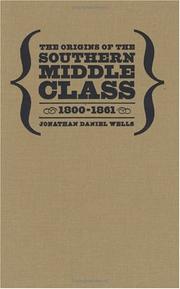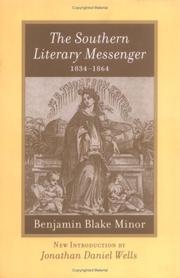| Listing 1 - 6 of 6 |
Sort by
|

ISBN: 0807876291 9780807876299 0807828823 9780807828823 0807855537 9780807855539 9798890873231 Year: 2004 Publisher: Chapel Hill University of North Carolina Press
Abstract | Keywords | Export | Availability | Bookmark
 Loading...
Loading...Choose an application
- Reference Manager
- EndNote
- RefWorks (Direct export to RefWorks)
Jonathan Daniel Wells contests the popular idea that the Old South was a region of essentially two classes (planters and slaves) until after the Civil War. He argues that, in fact, the region had a burgeoning white middle class that had a profound impact on southern culture, the debate over slavery, and the coming of the Civil War.
Middle class --- Bourgeoisie --- Commons (Social order) --- Middle classes --- Social classes --- History --- Social conditions --- Southern States --- Social conditions. --- Economic conditions.
Book
ISBN: 0820354848 9780820354842 9780820354859 0820354856 0820360368 Year: 2019 Publisher: Athens, Georgia
Abstract | Keywords | Export | Availability | Bookmark
 Loading...
Loading...Choose an application
- Reference Manager
- EndNote
- RefWorks (Direct export to RefWorks)
"The cause of disunion was the persistent determination on the part of enslaved people that they would flee bondage no matter the risks. By protesting against kidnappings and fugitive slave renditions, they brought slavery to the doorstep of the free states, forcing those states to recognize the meaning of freedom and the meaning of states' rights in the face of a federal government equally determined to keep standing its divided house. In so doing African Americans helped northerners and westerners to question whether or not the Constitutional compact was still worth upholding, a reevaluation of the republican experiment that would ultimately lead not just to Civil War, but to the 13th Amendment ending slavery. The real story of American freedom lay not with the Confederate Rebels or even with the Union Army, but instead rests with the tens of thousands of self-emancipated men and women who had to be the ones to demonstrate to the Founders and to succeeding generations of Americans the value of liberty"--
Slavery --- Fugitive slaves --- Political aspects --- History --- Legal status, laws, etc. --- United States.
Book
ISBN: 9780511998478 9781107012660 9781107649798 9781139138093 113913809X 110701266X 0511998473 9781139145428 1139145428 1139140310 1107229294 1283316862 1139139649 9786613316868 1139141228 1139142119 110764979X 9781139142113 Year: 2011 Publisher: Cambridge ; New York : Cambridge University Press,
Abstract | Keywords | Export | Availability | Bookmark
 Loading...
Loading...Choose an application
- Reference Manager
- EndNote
- RefWorks (Direct export to RefWorks)
The first study to focus on white and black women journalists and writers both before and after the Civil War, this book offers fresh insight into Southern intellectual life, the fight for women's rights and gender ideology. Based on new research into Southern magazines and newspapers, this book seeks to shift scholarly attention away from novelists and toward the rich and diverse periodical culture of the South between 1820 and 1900. Magazines were of central importance to the literary culture of the South because the region lacked the publishing centers that could produce large numbers of books. As editors, contributors, correspondents and reporters in the nineteenth century, Southern women entered traditionally male bastions when they embarked on careers in journalism. In so doing, they opened the door to calls for greater political and social equality at the turn of the twentieth century.
Women in journalism --- Journalism --- Periodicals --- Women's periodicals, American --- Literature publishing --- Women --- American literature --- Journalism and literature --- Literature and journalism --- Literature --- English literature --- Agrarians (Group of writers) --- Human females --- Wimmin --- Woman --- Womon --- Womyn --- Females --- Human beings --- Femininity --- Literary publishing --- Publishers and publishing --- Journals (Periodicals) --- Magazines --- Library materials --- Mass media --- Serial publications --- Newspapers --- Press --- Writing (Authorship) --- Publicity --- Fake news --- Women and journalism --- Women in the mass media industry --- American women's periodicals --- American periodicals --- History --- Publishing --- Press coverage --- Women authors --- History and criticism. --- Arts and Humanities
Digital
ISBN: 9780511998478 Year: 2011 Publisher: Cambridge Cambridge University Press
Abstract | Keywords | Export | Availability | Bookmark
 Loading...
Loading...Choose an application
- Reference Manager
- EndNote
- RefWorks (Direct export to RefWorks)
Journalism --- Graphics industry --- American literature --- Literature --- United States of America

ISBN: 1570036713 9781570036712 Year: 2007 Publisher: Columbia University of South Carolina
Abstract | Keywords | Export | Availability | Bookmark
 Loading...
Loading...Choose an application
- Reference Manager
- EndNote
- RefWorks (Direct export to RefWorks)
"The Southern literary messenger" enjoyed an impressive thirty-year run (1834-1864) and was, in its time, the South's most important literary periodical. Published in Richmond, Virginia, the monthly magazine was originally edited by Edgar Allan Poe and is remembered for publishing poems, fiction, and essays by the nation's leading authors - both male and female, northern and southern - including William Gilmore Simms, Paul Hamilton Hayne, Joseph G. Baldwin, John Pendleton Kennedy, Mary E. Lee, and Caroline Lee Hentz. In 1905, Benjamin Blake Minor (1818-1905), editor of the "Messenger" during the 1840s, wrote the only book-length study of the magazine. Minor recounts in detail the relationships he forged with notable authors and includes excerpts from correspondence with Poe and others. Most important, Minor identifies and discusses hundreds of lesser contributors who might otherwise remain anonymous. He also describes the struggles the magazine's editors endured as they published essays on the divisive issue of slavery. Minor's authoritative account of the journal's history and influence is augmented in this edition with a new introduction by Wells that places Minor's account in historical context.
Book
ISBN: 0826272088 9780826272089 9780826218636 0826218636 Year: 2010 Publisher: Columbia, Mo. London University of Missouri Press
Abstract | Keywords | Export | Availability | Bookmark
 Loading...
Loading...Choose an application
- Reference Manager
- EndNote
- RefWorks (Direct export to RefWorks)
"Taken together, these nine essays contribute to the picture of women increasing their movement into political and economic life while all too often still maintaining their gendered place as determined by society. Their rich insights provide new ways to consider the meaning and role of gender in the post-Civil War South."--BOOK JACKET.
Women --- Sex role --- Political activity --- History --- Geschichte 1900-2000 --- Southern States --- Politics and government
| Listing 1 - 6 of 6 |
Sort by
|

 Search
Search Feedback
Feedback About UniCat
About UniCat  Help
Help News
News